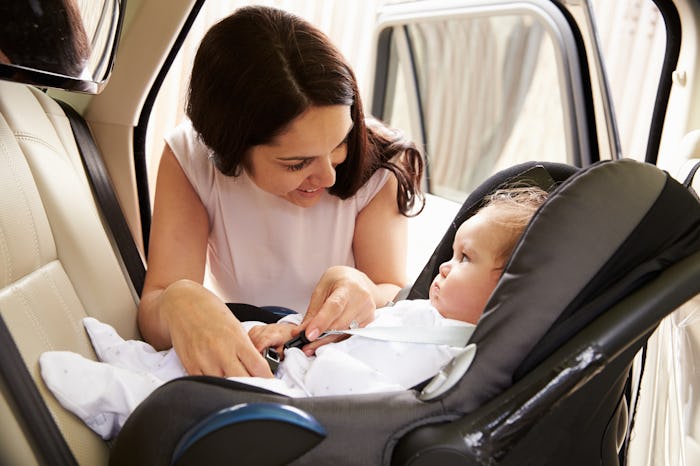
This Is Why Your Baby Hates Their Car Seat, According To An Expert
Obviously, putting your child in a car seat and knowing that’s the safest and only option for traveling in a car is a no brainer. But man, it's annoying when they kick, scream, and fuss the minute you strap them in — your perfect angel can go full gremlin mode immediately. This is a pretty common annoyance among parents, no doubt, but that doesn't help when you're wondering, "Why does my baby hate being in their car seat?"
Dr. Eboni Hollier, a board-certified doctor in developmental and behavioral pediatrics, as well as general pediatrics, tells Romper that first of all, “It is important for parents to remember that vehicle crashes are among the leading causes of death in children in the United States, and it is thought that many could be prevented through proper use of child safety seats. Per the American Academy of Pediatrics, children should have their car seats rear-facing until they are at least 2 years of age, or until they reach the highest weight or height as per their car seat manufacturer.”
With that said, it looks like you’ll be dealing with the dreaded car seat versus fussy baby battle for quite some time. Why do some babies cry every single time they’re put into a car seat? Hollier says it’s possibly because they’re being separated from their parent’s arms, where they feel the safest. “Others may cry once the car is in motion if they are bored, hungry, or even if they have motion sickness,” Hollier says. “If your child is older, for example, toddler age, they may resist being placed in their car seat because they may feel it is being forced on them without their having a choice in the matter.”
Or, it could be because the car seat isn’t buckled properly. “Certainly, if the straps of the car seat are too tight or if they have outgrown the car seat and their legs are too confined, this can be uncomfortable. Be sure that your baby’s car seat is the appropriate size for their height and weight,” Hollier adds.
Don’t worry, your baby can and will outgrow this behavior. But until then, Hollier has some tips to make it a little less traumatic, and maybe even make the behavior stop completely.
Even before going in the car, she suggests bringing the car seat in the house and have your little one sit and play in it. This makes them used to the car seat, and it’s not as big of a deal when they’re put in there to go in the car.
As for being in your vehicle, "Play some music during the car ride and sing along. Many parents say that their baby may enjoy lullabies, white noise, and other soothing sounds or music. Also, hearing your voice may help to calm your baby,” Hollier suggests.
Other tips include placing mobiles for your baby to look at, putting a mirror on the back of the headrest so they can look at themselves in the mirror, and making trips as short as you can, if possible. Hollier also says to make sure your baby is comfortable, because that can be what’s causing them to fuss. Make sure their clothes aren’t bunched up, there are no lumps in the back of the seat, that the sun isn’t shining too bright in their face, and it’s not too hot or too cold.
Having a “car seat survival pack” is also a great way to help ease car seat tension, especially with toddlers. The survival pack can include snacks, books, and small toys. Hollier also says giving your toddler a “choice” may help prevent tantrums. “Giving your toddler a choice such as, 'Would you like to get in the seat yourself, or should I sit you in the car seat?’ may be helpful in allowing them some sense of control in the situation,” she says, adding, however, that you should "avoid bribing and giving treats for sitting in the seat.”
Finally, and most importantly, Hollier says to remind yourself that you’re placing your child in the car seat for their safety. “Give yourself a mini mommy time-out, take a few deep breaths, and calm yourself. Then, in a very calm and empathetic voice explain that ‘I know you do not like getting in the car seat' but that he has to so that he is safe,” she says. “Emphasize gently that this is a rule that must be followed. Even if your baby is too young to understand what you are saying, hearing the kindness in your voice, and the loving expression on your face, will help and he will eventually understand.”
Car seats are just a fact of life for parents for the first several years of their child’s life. As the old saying goes, they may not like it, but “it’s for their own good.” Try not to stress, take a deep breath, and know you’re doing this for their safety. Your kid isn’t the only one who does this and all parents are in the same boat. Take as many “mini mommy timeouts” as you need, and know they’ll grow out of it (the tantrum and the car seat) — eventually.